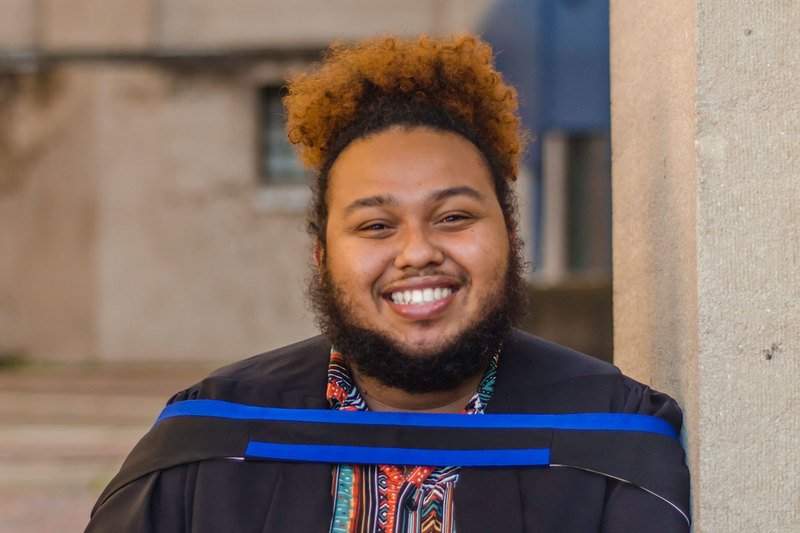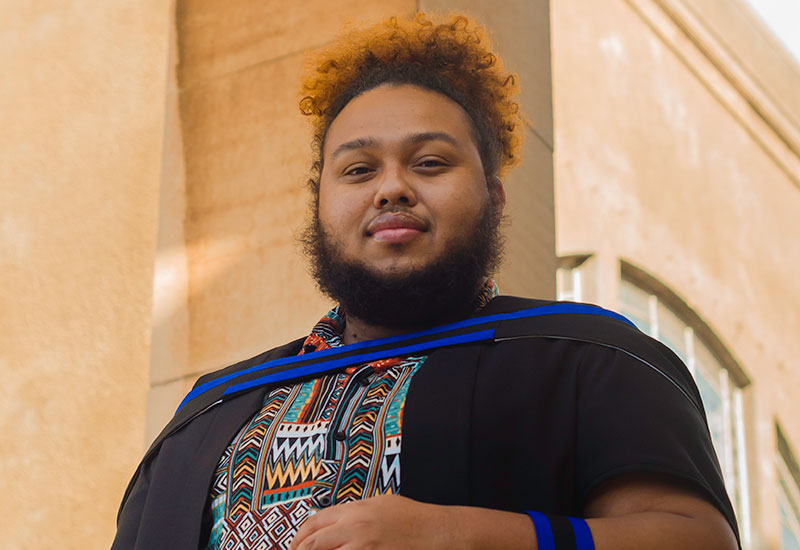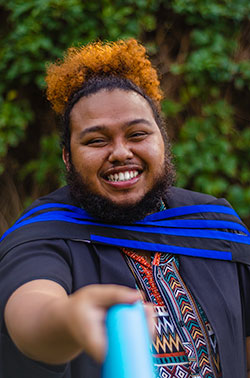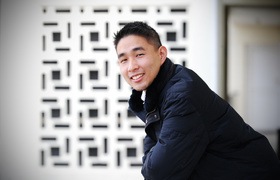A first-class pass for UCT graduate vannie Elsies
15 July 2021 | Story Carla Bernardo. Photos Masechaba Khoza. Read time 7 min.
It’s been a tough and testing journey for Lance‑Selae August but they are finally where they want to be: on the other side of their honours journey, and with four first-class grades for all four courses.
Lance‑Selae graduates on 15 July at the University of Cape Town’s (UCT) third virtual ceremony of this year’s graduation season. They graduate with BA Honours in Theatre & Performance, specialising in Applied Theatre, with first-class honours.
And they do this despite a long road with many twists, turns, bumps, stops and starts.
Diagnosis: TB
Lance‑Selae grew up in Elsies River, a suburb on the Cape Flats, which has produced fellow artists such as musician Robbie Jansen, top-cop-cum-author Jeremy Vearey and the poetic priest and dean of the Cathedral of St George the Martyr, Father Michael Weeder.
As a child, Lance‑Selae watched a lot of television.
“I had big dreams of becoming a TV presenter and actor, and I knew that to achieve that, [I’d ideally have to] go and study drama,” they said.
After matriculating from Elsies River High School in 2011, Lance‑Selae made their first attempt at tertiary education – but that “didn’t really work out”. Without the necessary funding, and under pressure to bring home an income, they instead entered the workforce, doing so from 2012 to 2016.
“I was so scared that I would die.”
They worked as a cleaner, telephonist, administrator, and personal assistant to a director at a law firm, and then, in 2016, as a school administrator. But by the end of that year, they were diagnosed with multidrug-resistant tuberculosis (MDR‑TB).
Prior to the diagnosis, they were constantly misdiagnosed: first with bronchitis and then with upper and lower respiratory tract infections. After a month on medication, X‑rays revealed that they had pulmonary TB. After their body didn’t respond to the standard TB regimen, the diagnosis and medication changed again.
“I lost bizarre amounts of weight – 14 kg at one stage – was unable to eat, take care of myself – and what was worse is that I was alone; I stayed alone.”
“I was so scared that I would die,” said Lance‑Selae.
Fortunately, after another change in medication, they pulled through. But the impact would be felt years later.
Political. Theatre.
Things started to look up in 2017 as Lance‑Selae enrolled at UCT for a BA, majoring in Drama, and Media and Writing. While the first year was tough and had them questioning whether drama was in fact the right choice, second year provided the turning point with the “Learning through Drama and Theatre” course.
“I found that I have a big interest in drama as a mode of learning. I developed a passion for applied theatre, which is basically a wide range of theatre practices that aim to provoke or shape social change,” they explained.
Lance‑Selae and their classmates worked in schools (theatre in education), development settings (theatre for development, community theatre, theatre for good intentions), disability settings (inclusive theatre), prisons (prison theatre) and with the elderly (to create museum or reminiscence theatre).
“This form of theatre intersects strongly with my political interests, and through applied theatre, I’ve found a creative outlet for political expression,” they said.

Lance‑Selae also found political expression through student governance. In 2018 they served as academic and media coordinator for Liesbeeck Gardens residence’s executive committee; in 2019 they served the residence again (this time as secretary‑general) and as Academic Chair: Arts, on the Humanities Students’ Council.
At the end of 2019, Lance‑Selae was elected to the UCT Students’ Representative Council (SRC) and served as the undergraduate academic coordinator. In 2020 they were re‑elected and appointed to the same portfolio. However, due to burnout from three successive years in leadership roles, they resigned in January 2021. The other contributing factor was their health: nearly four years after their MDR‑TB diagnosis, Lance‑Selae spent 2020 and early 2021 battling three bouts of bronchitis and then COVID‑19.
Now in a far better place, they reflected on the highs of their time as a student leader, citing contributions such as drafter, facilitator and project lead for the SRC 2019/2020 Business Continuity Proposal (a framework for continued operations of the SRC as UCT moved into Emergency Remote Teaching mode); project‑managing the first‑ever virtual Class Representative and Faculty Council induction programmes on Vula; and participating as a panellist in two Teaching and Learning Conferences.
To be coloured
Along with their contributions to student governance, and fighting bronchitis and COVID‑19, the last year has also marked a major milestone in Lance‑Selae’s academic journey. For their honours research, they looked at the potential ways to rethink, reframe and rewrite what it means to be coloured in post-apartheid South Africa. They did this through a workshop process using Theatre of the Oppressed modalities.
“Traditional and social media perpetuates a linear and one‑dimensional or stereotypical way of what ‘colouredness’ is.”
“It’s an important topic because traditional and social media perpetuates a linear and one‑dimensional or stereotypical way of what ‘colouredness’ is. This results in a growing and misplaced hegemonic perception and discourse on what it means to be coloured,” said Lance‑Selae.
Their research found that to change this, a shift is needed from consuming and fuelling the dominant discourse, to embracing a personal discourse; “one that enables self‑representation of one’s racial identity”.
Feedback from workshop participants was largely about having discovered their agency in defining what it means to be coloured, and feelings of liberation and empowerment.
Support and next stops
Reflecting on the long and often bumpy road travelled, Lance‑Selae reckons they would not have made it without the support of their supervisor, Morne Steyn, and their father.

Steyn, a lecturer in UCT’s Centre for Theatre, Dance & Performance Studies, provided a constant ear to Lance‑Selae’s “complaints and anxieties” and practised a “very firm, tough‑love approach” that carried them through.
As for their father, Lance‑Selae is grateful for his support and for offering them a place to stay in 2020 during hard lockdown.
“It was also the first time that I was in a family environment during studies, as most of my adult life has been independent of my parents. I think that this nurturing home contributed to my academic successes,” they said.
“My father would often come at me with, ‘Jy bly heeldag in meetings! Doen ’n bietjie jou skoolwerk!’” (You’re in meetings the entire day! Do some schoolwork!)
Now, the UCT graduate vannie Elsies (from Elsies River) is embarking on their next journey. First stop: completing their MA in Theatre research proposal that looks at whether participatory theatre can prepare learners serving on representative councils to become democratic citizens in the schools where they operate. And the second stop is authoring a chapter in a peer‑reviewed volume where they’ll be using their ‘Coloured Subjectivities’ theatre experiment as a case study, within the context of learning design.
 This work is licensed under a Creative Commons Attribution-NoDerivatives 4.0 International License.
This work is licensed under a Creative Commons Attribution-NoDerivatives 4.0 International License.
Please view the republishing articles page for more information.










